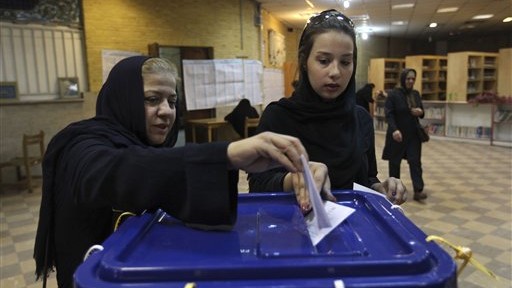March 17, 2017

President Rohani and Supreme Leader Ali Khamenehi attacked the United States last week for having the gall to criticize Iran’s elections.
Khamenehi made mention of “this huge scandal” in last year’s presidential election and asked how the Americans could criticize elections held by the Islamic Republic.
Rohani earlier attacked the United States at greater length. “I believe that those criticizing elections in Iran need to take a look at their own recent elections and the problems they have had,” Rohani said in a speech last Tuesday. “Elections in Iran are free, healthy and competitive…. Even the current American president has cast doubt on the legitimacy of the election before he was elected.”
Rohani indicated he was irritated by the State Department report on human rights in Iran that was released last month, which contained a section on elections.
The State Department’s chief criticisms of Iran’s elections were contained in one sentence: “The country’s electoral system continued to fall short of international standards for free, fair elections because of the Guardian Council’s preeminent roles in the political process, including determining which individuals could run for office, and removing elected candidates.”
This same point was contained in the 2015, 2014 and 2013 reports, with the 2016 report merely adding the reference to the Council of Guardians removing some people after they were elected to the Majlis last year. But Iranian officials did not react at all in those years. The 2012 report was actually a bit harsher. It said, “On March 2, the country held legislative elections which outside observers regarded as neither free nor fair.”
Rohani said the American elections fell far short of recognized standards, noting that President Trump had himself regularly attacked the election process during the campaign. Trump called the system “rigged” and “corrupt” before the balloting and asserted after the election that three to five million illegal aliens had voted for his opponent and deprived him of a popular vote majority.
Neither Rohani nor Khamenehi mentioned that the State Department report had criticized the fact that the regime decided who could run for office in Iran, and the Iran Times did not see any Iranian newspaper account that mentioned the State Department’s main criticism.
Rohani said the turnout of 70 percent in the last presidential election and the long lines at polling places proved that the Iranian public believes in the election system.
Majlis Speaker Ali Larijani joined in the attack, saying it was “rude” of the United States to criticize Iran’s lections.
Khamenehi said, “The US criticism of Iran’s elections under the pretext that the elections are not free is hollow. Their election scandal and ethical and moral failure on the campaign trail has belied their claims to run free and fair elections that would provide examples of good conduct.” He cited the “moral collapse” of last year’s “candidates,” using the plural. The regime has always equated the campaign conduct of Hillary Clinton to that of Donald Trump.
Here is the full text of the part of the 2016 human rights report on elections in Iran. The text refers to 86 members of the Assembly of Experts, but that number was raised to 88 last year, while the State Department used the same phrasing as it had in the previous few years. The State Department report is certainly a more balanced analysis of the Iranian elections than the Rohani and Khamenehi comments on the US elections. For example, the State Department report clears Iran of the frequent charge of vote tampering.
Section 3. Freedom to Participate in the Political Process
“The constitution provides citizens the ability to choose the president, as well as members of the Assembly of Experts and Islamic Consultative Assembly (parliament), peacefully through elections based on universal suffrage, but candidate vetting conducted by unelected bodies abridged this right in all instances. The Assembly of Experts, which is composed of 86 popularly elected clerics who serve eight-year terms, elects the supreme leader, who acts as the recognized head of state and may be removed only by a vote of the assembly. The Guardian Council vets and qualifies candidates for all Assembly of Experts, presidential, and parliamentary elections based on criteria that include candidates’ allegiance to the state and Shia Islam. The council consists of six clerics appointed by the supreme leader and six jurists nominated by the head of the judiciary and approved by parliament. There is no separation of state and religion, and certain clerics had significant influence in the government.
Elections and Political Participation
“Recent Elections: The country’s electoral system continued to fall short of international standards for free, fair elections because of the Guardian Council’s preeminent roles in the political process, including determining which individuals could run for office, and removing elected candidates. In February both Assembly of Experts and Islamic Consultative Assembly elections were held. Prior to the elections, the Guardian Council disqualified 79 percent of the candidates running for the Assembly of Experts (including all female candidates) and 58 percent running for the Islamic Consultative Assembly, with media reporting only 1 percent of registered reformist candidates were allowed to run. Voter turnout for the election was around 62 percent, and runoff elections for those seats where no candidate won an outright majority were held in May. Minoo Khalegi from Esfahan District had her election to the Islamic Consultative Assembly nullified by the Guardian Council after she was deemed “unfit” to hold office. Outside observers were not permitted to monitor the elections, but media reporting indicated that there was no apparent vote tampering.
“In 2013 voters elected Hassan Rohani president. The Interior Ministry announced that Rohani won 50.88 percent of the votes with a 72 percent turnout of eligible voters. The Guardian Council approved eight candidates for president from 686 individuals who registered as candidates. It did not approve any female registrants. The UN special rapporteur reported that several candidates were excluded because of involvement in post-election protests in 2009.”



















